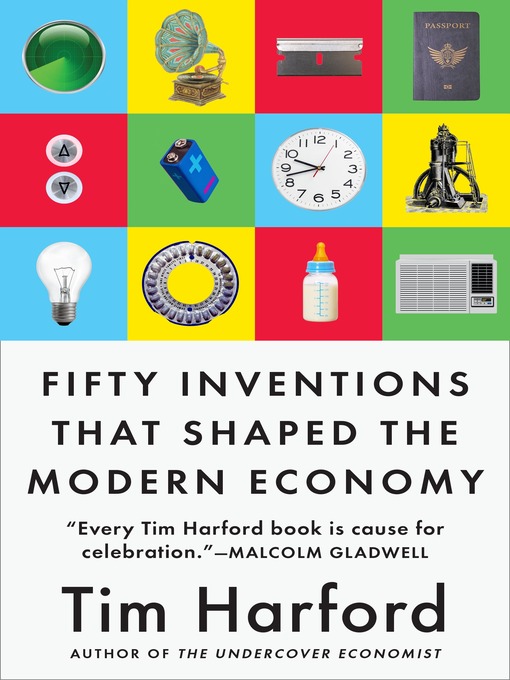- Popular Magazines
- Just Added
- Cooking & Food
- Fashion
- Health & Fitness
- Home & Garden
- News & Politics
- See all magazines collections
Look out for Tim's next book, The Data Detective.
A lively history seen through the fifty inventions that shaped it most profoundly, by the bestselling author of The Undercover Economist and Messy.
Who thought up paper money? What was the secret element that made the Gutenberg printing press possible? And what is the connection between The Da Vinci Code and the collapse of Lehman Brothers?
Fifty Inventions That Shaped the Modern Economy paints an epic picture of change in an intimate way by telling the stories of the tools, people, and ideas that had far-reaching consequences for all of us. From the plough to artificial intelligence, from Gillette’s disposable razor to IKEA’s Billy bookcase, bestselling author and Financial Times columnist Tim Harford recounts each invention’s own curious, surprising, and memorable story.
Invention by invention, Harford reflects on how we got here and where we might go next. He lays bare often unexpected connections: how the bar code undermined family corner stores, and why the gramophone widened inequality. In the process, he introduces characters who developed some of these inventions, profited from them, and were ruined by them, as he traces the principles that helped explain their transformative effects. The result is a wise and witty book of history, economics, and biography.
-
Creators
-
Publisher
-
Release date
August 29, 2017 -
Formats
-
Kindle Book
- ISBN: 9780735216150
-
OverDrive Read
- ISBN: 9780735216150
- File size: 999 KB
-
EPUB ebook
- ISBN: 9780735216150
- File size: 935 KB
-
-
Languages
- English
-
Reviews
-
Kirkus
A well-known British economist shapes his radio broadcasts into chapters of a diverting collection of what he considers humanity's greatest inventions.Best taken in small doses, the chapters sometimes cover the expected territory but more often head off in surprising directions. For Financial Times senior columnist Harford (Messy: The Power of Disorder to Transform Our Lives, 2016, etc.), an invention might be a concrete object, like a plow or a battery, but it's just as likely to be a more abstract idea, like intellectual property or index funds. Fortunately, the author has a knack for making potentially dry and demanding concepts spring to life. For example, in a chapter on management consulting, Harford darts from a messy factory in contemporary Mumbai back to the 1930s to introduce the first cigar-chomping management consultant and the creation of a consulting company requiring its employees to wear white shirts and hats--and then back to Mumbai, pointing out telling details along the way. The author shines when tackling seemingly homely topics. Writing about barbed wire, he weaves together the philosophy of John Locke into a discussion of a material that its marketer called "lighter than air, stronger than whiskey, cheaper than dust." Some might quibble that Harford awards a disproportionate amount of attention to relatively modern inventions. However, he makes it clear that these are personal choices, and his zest for his subjects makes them hard to resist; his lively, humorous style and wide-ranging curiosity make hard topics go down easily. And while the essays stand on their own, he has a broader point to make. "Inventions shape our lives in unpredictable ways," he writes, "and while they're solving a problem for someone, they're often creating a problem for someone else." Harford's contagious delight in his subject reminds readers not to take for granted the impact of objects and ideas so familiar they're easy to overlook.
COPYRIGHT(2017) Kirkus Reviews, ALL RIGHTS RESERVED. (Online Review)
-
Booklist
September 15, 2017
Journalist and economist Harford covers broad territory in this look at some of the factors that helped create our economic system. Some are obvious: the plow, for example, which not only mechanized agriculture but (as a consequence) also allowed many people to focus on other things, like mining, building, and generally creating modern civilization; or banks, which not only kept people's money safe but also allowed for currency exchanges, the buying and selling of debt, and the opportunity for people to borrow money they didn't have. But he also talks about things we don't ordinarily think of as major economic factors, like the gramophone (mass production of music created what we now know as superstars), or the Google search, which, by allowing consumers to do rapid-fire price comparisons, puts the financial power in the hands of the consumer rather than the vendor, or the elevator (a different form of mass-transit system that allows for taller buildings and greater access to them). An eye-opening and thought-provoking account that is about as far away from a boring economics book as you can get and still be an economics book.(Reprinted with permission of Booklist, copyright 2017, American Library Association.)
-
Formats
- Kindle Book
- OverDrive Read
- EPUB ebook
subjects
Languages
- English
Loading
Why is availability limited?
×Availability can change throughout the month based on the library's budget. You can still place a hold on the title, and your hold will be automatically filled as soon as the title is available again.
The Kindle Book format for this title is not supported on:
×Read-along ebook
×The OverDrive Read format of this ebook has professional narration that plays while you read in your browser. Learn more here.


